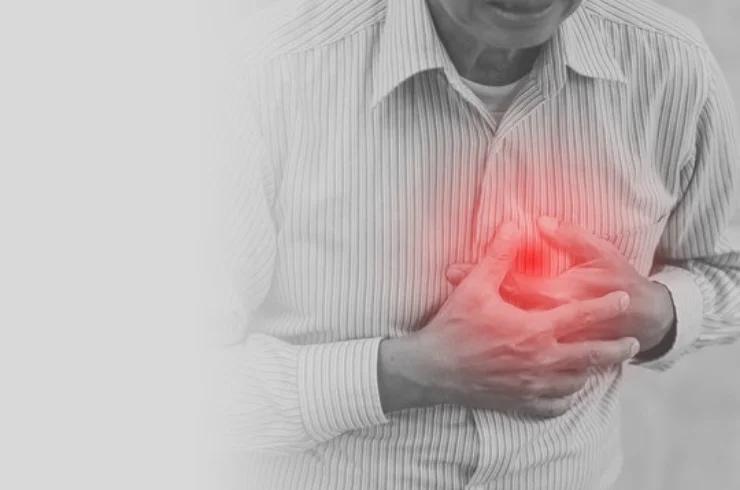Heart Failure

Heart Failure is a chronic condition in which the heart cannot pump blood efficiently enough to meet the body’s needs. Despite its name, heart failure doesn’t mean the heart has stopped working entirely—it means the heart is not working as well as it should. It can affect one or both sides of the heart and often develops gradually over time.
This condition can cause a range of symptoms, including fatigue, shortness of breath, and swelling, significantly impacting daily life if not properly managed.
What Causes Heart Failure?
Heart failure can result from various underlying conditions that weaken or damage the heart. Common causes include:
- Coronary Artery Disease (CAD): Blocked or narrowed arteries reduce blood flow to the heart.
- High Blood Pressure (Hypertension): Forces the heart to work harder, leading to weakened muscles over time.
- Heart Attack: Damages the heart muscle and reduces its pumping ability.
- Valvular Heart Disease: Malfunctioning heart valves disrupt blood flow.
- Cardiomyopathy: Diseases of the heart muscle, often due to genetics, infections, or excessive alcohol use.
- Diabetes: Increases the risk of damage to the heart and blood vessels.
Symptoms of Heart Failure
Heart failure symptoms can range from mild to severe and may include:
- Shortness of breath during activity or while lying down.
- Fatigue and weakness, making everyday tasks difficult.
- Swelling (edema) in the legs, ankles, feet, or abdomen.
- Rapid or irregular heartbeat (palpitations).
- Persistent cough or wheezing, sometimes with pink-tinged mucus.
- Difficulty concentrating or a feeling of mental fog.
If you notice these symptoms, especially if they worsen over time, consult a cardiologist immediately.
Types of Heart Failure
- Left-Sided Heart Failure: Affects the left ventricle, the heart’s main pumping chamber.
- Right-Sided Heart Failure: Causes fluid buildup in the abdomen, legs, and feet.
- Congestive Heart Failure (CHF): Fluid accumulation in the lungs and other tissues leads to congestion and swelling.
How is Heart Failure Diagnosed?
Diagnosing heart failure involves a combination of medical history, physical exams, and diagnostic tests such as:
- ECG: To check for irregular heart rhythms.
- 2D Echo: To assess the heart’s structure and function.
- TMT (Treadmill Test): To evaluate the heart’s response to stress.
- Blood Tests: To check for underlying conditions or markers of heart failure.
Can Heart Failure be Treated?
Yes, heart failure is manageable with the right treatment plan. Treatment focuses on improving symptoms, slowing disease progression, and enhancing quality of life.
- Lifestyle Changes: Eating a heart-healthy diet, reducing salt intake, quitting smoking, and exercising as recommended.
- Medications: ACE inhibitors, beta-blockers, diuretics, or other drugs prescribed to improve heart function.
- Advanced Therapies: In severe cases, procedures like angioplasty, valve repair, or implantable devices like pacemakers may be recommended.
Why Choose Kurnool Cardiac Center for Heart Failure Care?
At Kurnool Cardiac Center, we provide comprehensive heart failure care, combining advanced diagnostic tools and tailored treatment plans. Under the expert guidance of Dr. Nagendra Prasad Thota, our team is dedicated to helping patients live better and healthier lives despite heart failure.
Don’t ignore the signs. Take the first step toward managing heart failure by scheduling your consultation today!
Treatments
- ECG
- 2D Echo
- TMT (Treadmill Test)
- Angiogram
- Angioplasty
- Bypass Surgery
- Heart Failure
- Valvular Heart Diseas
- Arrhythmias
- Cardiomyopathy
- Congenital Heart Defects
- Lipid Disorders
- Coronary Artery Disease
- Coronary Angioplasty and Stenting
- Percutaneous Coronary Intervention
- Coronary Artery Bypass Grafting
- Mitral Valve Repair or Replacement
- Atrial Septal Defect Closure
Consult Kurnool’s Leading Heart Specialist
Reach out to Kurnool Cardiac Center and meet Dr. Nagendra Prasad Thota for advanced diagnostics and treatment.
